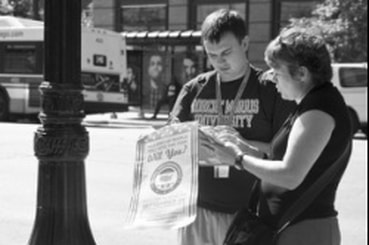 Photo by A. Rezin http://bit.ly/16rqWiK Photo by A. Rezin http://bit.ly/16rqWiK I have a soft spot for Volunteers with Tom Hanks and John Candy because it's one of the rare movies about the Peace Corps and where Tom Hanks doesn’t portray the “good guy.” Instead, Hanks plays Lawrence Bourne III, a wealthy playboy with a gambling problem who accidentally joins the Peace Corps while escaping his bookie. Candy plays Tom Tuttle, a do-gooder volunteer who also lives in the village where Bourne is assigned. At one point, Bourne explains his lackadaisical attitude towards making a difference in one short line, "It's not that I can't help these people. It's just I don't want to." I spend many evenings a month with different voluntary organizations in my neighborhood. I enjoy meeting my neighbors and learning about what they care about, but I often wonder why it’s the same dozen or so people. Most of my neighbors want positive change in the community and believe it's important to be part of the democratic process, so why don't they show up? Can a nonprofit somehow figure out who is likely to volunteer and who isn't? What makes someone stop being a Bourne and start being a Tuttle? I spent much of my career working with volunteers on policy issues. The most important someone gives up their time is to fix an immediate problem. Other reasons include values, civic duty, faith, professional advancement, and meeting new people. But what determines who continues to volunteer and who doesn’t? Based on my experiences both managing volunteers and being one, I believe three main variables - time, knowledge, and passion - differentiate between the Bournes and the Tuttles of the world.
Time - What does a person give up to volunteer? Playing with their children? Housework? Spending time with friends? In my experience, volunteers are overwhelmingly stay-at-home moms, retirees, or self-employed people who manage their own schedules. The second biggest group is young people who do not have as many demands on their time. No matter which group they belong to, respecting a volunteer's time helps make sure the volunteer will return. Knowledge - Volunteers, especially with advocacy organizations, need to know their rights as citizens and where they can affect the most change in government. Is it a local issue they should bring up with the mayor? A national issue that needs a senator's attention? Which branch controls the issue? Knowledge is power, and recent studies show a correlation between civic education and civic engagement. As a policy advocate, I have always known that educating volunteers on the "hows and whys" is key to a successful campaign, but as a former social studies teacher, I am glad people see the connection between civic education and the health of our democracy. Providing knowledge to your volunteers through fact sheets, training sessions, and other educational opportunities will keep them coming back. Passion - Merriam Webster defines passion as "a strong feeling of enthusiasm or excitement for something or about doing something." What made me spend four hours registering voters on Tuesday when I had a million other things to do? Why would high school students give up their winter break to study poverty issues? Why would a group of women race in Miami to raise awareness about chocolate companies' employment practices? Learning why your volunteers show up and developing individual opportunities to stoke their passion will keep volunteers engaged. I will keep thinking about how to identify the Tuttles from the Bournes as I work with different organizations and help them manage their volunteers. In the interim, remember the flip side of "the why" is "how" to keep volunteers involved and key to this is making sure they feel their valuable time is used for a good cause, empowering them to make a difference, and remembering they are individuals with different motivations, skills, and passions.
0 Comments
Your comment will be posted after it is approved.
Leave a Reply. |
annisa's blogIncludes professional topics, as well as thoughts about politics. I also keep a blog on Medium that includes these, as well as more personal posts. archives
January 2020
categories
All
|

 RSS Feed
RSS Feed